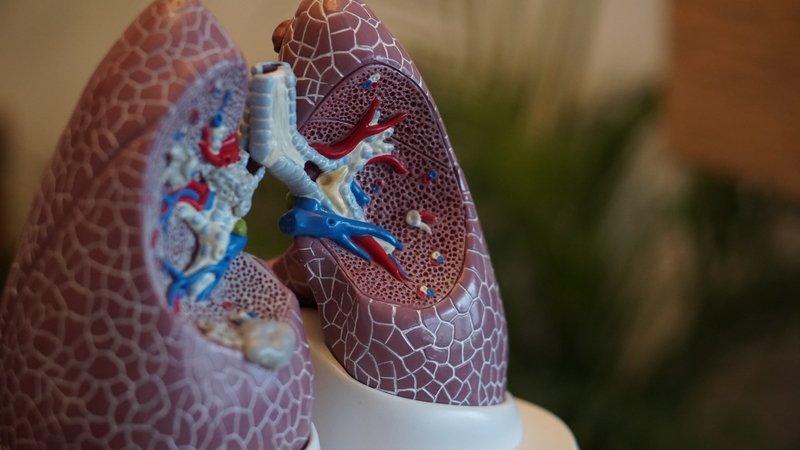Combining immunotherapy, anti-angiogenic drugs and chemotherapy is an FDA-approved strategy for treating non-small lung cancer. Roche’s cocktail of Tecentriq, Avastin and chemo is one example. But some patients develop resistance to the treatment. Now, a research team at the Swiss Federal Institute of Technology in Lausanne (EPFL) has shed some light on the reason behind resistance and proposed a way to improve the combo.
PD-1/L1 inhibitors work by removing a restraint tumor cells use to keep immune cells from killing them, while anti-angiogenic drugs starve tumors of key nutrients by blocking the growth of new blood vessels. The EPFL team showed that macrophages, white blood cells that specialize in clearing cellular garbage, are probably to blame for reduced efficacy of both treatments.
Suppressing tumor-associated macrophages with a combination of a CSF1R inhibitor and the chemotherapy cisplatin could improve tumor response to anti-angiogenic immunotherapy in mice, the team reported in the cover article of the latest issue of Science Translational Medicine.
The EPFL scientists started their research by testing a bispecific antibody dubbed A2V, which blocks ANGPT2 and VEGFA in a mouse model of lung cancer with genetic mutations that cause resistance. The therapy inhibited the growth of most tumors, the team reported.
Previously, some members of the EPFL team had found that anti-angiogenic drugs could increase the number of CD8+ killer T cells that can penetrate tumors, thereby contributing to a favorable tumor microenvironment that could help a PD-1/L1 inhibitor better do its job.
But in the current study, the researchers were surprised to discover that adding PD-1 blockade to A2V failed to improve tumor response in mice at any time point during the analysis. In fact, some rodents with mutated lung cancer that got the combo experienced even more aggressive tumor growth than those on solo A2V did.
After examining the tumors, the scientists found that more CD8+ T cells did migrate to tumors. However, the anti-angiogenic drug appeared to have recruited another type of T cell—regulatory T cells, or Tregs—that reins in the immune response.
“This was bad news, because Tregs are known to be immunosuppressive, meaning that they can thwart the immune response by CD8 T cells against cancer,” explained Ece Kadioglu, the study’s co-first author, in a statement. “The [checkpoint inhibitor] could not distinguish between ‘good’ CD8 T cells and ‘bad’ Tregs. It was empowering both. More Tregs mean more immunosuppressive effect, facilitating tumor growth.”
In tumors, macrophages are known to mostly support cancer survival and growth through various mechanisms, including the promotion of Tregs. To delete tumor-associated macrophages, the EPFL team turned to a CSF1R inhibitor dubbed 2G2 and the commonly used chemotherapy cisplatin. CSF1R is a key receptor on macrophages that induces differentiation, and some macrophages are sensitive to cisplatin.
The combination of A2V, anti-PD-1, cisplatin and CSF1R inhibitor induced the regression of 71.3% of tumors in mice, which was far better than the response seen with A2V plus anti-PD-1, the team reported. What’s more, most of the tumors progressed in a group of mice treated with A2V, cisplatin and anti-CSF1R, indicating that the PD-1 inhibitor was necessary, the researchers noted.
Inhibition of CSF1R isn’t a new idea in oncology, but the field has seen its fair share of setbacks. Roche tried but failed to develop its anti-CSF1R candidate emactuzumab. It’s now being spun toward tenosynovial giant cell tumors at SynOx therapeutics.
Five Prime Therapeutics, now part of Amgen, once had a billion-dollar collaboration with Bristol Myers Squibb around the potential combination of the CSF1R inhibitor cabiralizumab and the Big Pharma’s PD-1 inhibitor Opdivo. But that program bit the dust last year after a phase 2 flop in pancreatic cancer.
As for tumor-associated macrophages, their immunosuppressive role has also attracted much interest in cancer research. Verseau Therapeutics is working on therapies designed to convert macrophages into an anti-tumor state. Sanofi recently paid $160 million upfront to buy out Tidal Therapeutics, which is using mRNA to encode for transcription factors that can reverse immunosuppression of tumor-associated macrophages.
The EPFL now believes that the four-drug combination including a CSF1R inhibitor could offer a viable immunotherapy strategy against non-small lung cancer. Because the regimen’s components are either FDA-approved or have already been tested on humans, a clinical trial testing the theory could be expedited, Michele De Palma, Ph.D., the study’s senior author, said in the statement.

